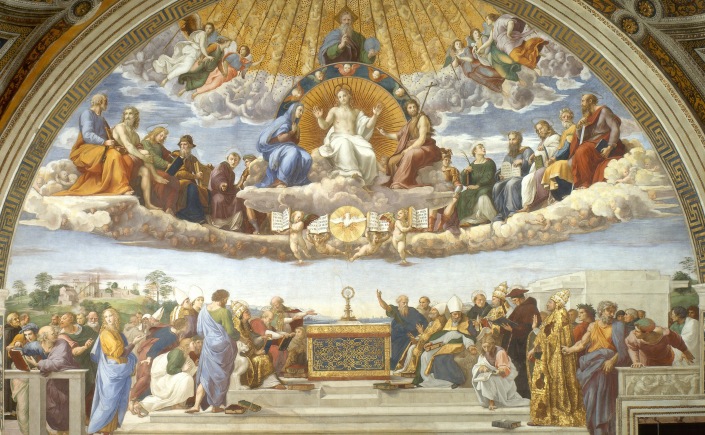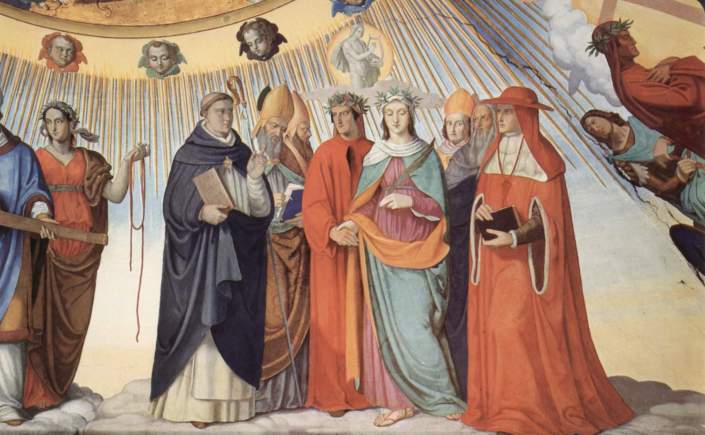Behold our universe: the horizons of which we cannot perceive, the intricacies of which we cannot plumb. The entire cosmos dances to some profound, utterly divine melody; it dances and it sings along in the harmonious chorus of existence. The stars shout the glory of light and warmth. The planets circle their suns, pulled in by their radiant beauty. The very atoms and molecules, the stones from which this majestic palace of the universe was crafted, sway with the winds of an eternal breath. All beings ordered to their time and place and way, all things directed to their specific ends, all in jubilant obedience to their Maker and Sustainer.
The galaxies shout praises to the Creator in their fiery exultation. The planets sing hymns of laud to their God and King as they sweep from one end of the solar system to the next. The oceans roar, the mountains rise, the birds soar and fish dive, the creatures saunter and crawl, all to the glory of the Lord.
And yet all these beings, though the very innermost depth of their being flows directly from, and is constantly directed to, God as their Creator and Sustainer, the First Cause and Final End of all things, this is done in them without conscious knowledge, an open awareness of both their internal selves and the external world. In all of creation, this privileged position of knowledge has been granted to mankind. And with this honorable position comes immense duty.
A duty which we have squandered.
All of creation succeeds in that every being therein is itself, exists as itself, as it was meant to, and fulfills its intrinsic ends/purposes. This is the ultimate duty of all beings: to be itself, as it was so designed and intended by the Divine Craftsman. It is the duty of all stars to shine, the duty of all planets to orbit, the duty of all trees to grow and bear fruit, the duty of all bees to buzz and pollenate and produce honey, the duty of all ants to crawl and march and build and protect their queen, the duty of all mice to scurry and squeak, the duty of all birds to flap wings and fly, the duty of all waves to crash upon the shore. All these beings, down to the most minuscule of subatomic particles, all have their purpose, all have their duty, and in ordered obedience to this duty they glorify God in their very being.
And of all creation, humans alone were granted the gift of knowing their own existence, knowing their own duty and purpose, and, ultimately, thereby knowing their Creator and Sustainer. This knowledge and will are the distinctive human gifts. It is the duty of man to know God, the duty of man to will the good in obedience to God. All other beings enact their existential dramas and fulfill their duties unconsciously, automatically, without choice or awareness. Human beings were given the opportunity to do so fully consciously, freely, with knowledge. And thus human beings alone were given the opportunity of the ultimate good and happiness and joy of all existing things: the Beatific Vision, conscious experience of and union with the Divine Reality. To know God as God.
It was the duty of man to know God and to consciously glorify God to and for all creation. We, as rational animals, as immortal souls in mortal flesh, were meant to be the ambassadors between God and creation. On this very speck of death, mankind was meant to be the mouth from which all creation could pour forth the wondrous joy it held inside, the ecstatic delight of its own mystical existence.
Placed as such above all creation, to lift all creation to God, how disastrous then becomes our fall! For in thus falling, we become actually the lowest of all creatures, lower than all other beings in creation. For all other beings in the entire universe are themselves, are what they were truly meant to be; and in falling, humanity fails to be humanity. Humanity fails to be what we were meant to be. In falling, humans don’t just become something less than human–we become something less than creation itself. For creation in its very essence is good, the gift of existence flowing from Divine Source. But in our fall, mankind rebelled against this divine gift of existence. We chose to be something other than what we are, because to be what we truly are would require the one thing for which we were made: obedience to the Divine Will. How easy for a bird to fulfill the Divine Command to chirp! But what great burden for man, with his own knowledge and will, to submit that will to Another.
Evil, essentially, is disordered existence. Evil is the lack of Goodness which is humanity being as it is meant to be. Evil is humanity failing to be truly human. Evil is man being less than man.
Imagine the horror if the stars rebelled and refused to shine! Imagine the tragedy if the particles and atoms and molecules all rebelled, and refused to join in their chemical community to produce our cosmos! So how terrible, how monstrous, how dark, how absurd it is, for man to rebel and refuse to be man! The wondrous song and dance of creation suddenly was thrown out of tune into a horrid tension. The humans fought and killed each other, they were angry and sorrowful and wretched and lustful and prideful and selfish and hateful, the exact opposite of what they had been meant to be. They created societies and civilizations, driven by greed and fear, ruled by oppression and injustice. They fought wars and enslaved fellow men. They tore at the earth and at each other.
And so how infinitely, overwhelmingly profound is it, that God should save man by not refusing to be man, by Himself becoming man to teach us how to be man! Jesus Christ, the God-man, was the first truly and fully human person in the history of our race. He was the second Adam, who overcame our broken nature, to restore our ruined flesh. When we look to Christ, we see God. But equally as true: when we look to Christ, we see humanity, as it was truly meant to be. The wonder of the Incarnation is not just Divine; it is also human.
How incomprehensible that which God accomplished in Christ! Human reason cannot capture Him, and yet a manger held Him. Human hands cannot reach Him, and yet a mother swaddled Him. The human mind cannot contain Him, and yet our lowly planet enclosed Him. Death cannot touch Him, and yet nails pinned Him to a cross.
St. Irenaus wrote: “Gloria Dei est vivens homo.” The Glory of God is living man. Christ was the first and true living man, the man who fulfilled the duty of men and thus completed the purpose of all creation. The man who tasted and defeated death, so that all men can become living men.
G. K. Chesterton wrote this beautiful poem, The House of Christmas:
There fared a mother driven forth
Out of an inn to roam;
In the place where she was homeless
All men are at home.
The crazy stable close at hand,
With shaking timber and shifting sand,
Grew a stronger thing to abide and stand
Than the square stones of Rome.
For men are homesick in their homes,
And strangers under the sun,
And they lay on their heads in a foreign land
Whenever the day is done.
Here we have battle and blazing eyes,
And chance and honour and high surprise,
But our homes are under miraculous skies
Where the yule tale was begun.
A Child in a foul stable,
Where the beasts feed and foam;
Only where He was homeless
Are you and I at home;
We have hands that fashion and heads that know,
But our hearts we lost – how long ago!
In a place no chart nor ship can show
Under the sky’s dome.
This world is wild as an old wives’ tale,
And strange the plain things are,
The earth is enough and the air is enough
For our wonder and our war;
But our rest is as far as the fire-drake swings
And our peace is put in impossible things
Where clashed and thundered unthinkable wings
Round an incredible star.
To an open house in the evening
Home shall men come,
To an older place than Eden
And a taller town than Rome.
To the end of the way of the wandering star,
To the things that cannot be and that are,
To the place where God was homeless
And all men are at home [1].
Much could be said about these words, but that line towards the end specifically stuck out: “To the end of the way of the wandering star”. It’s referring, of course, to the star of Bethlehem, which guided many to see Christ. But in another sense, I think we could say that planet earth is the wandering star, the star which went rogue, the lone star of all stars in all the heavens which abandoned its way and fell from its light and life. And Christ is thus the end of the way of the wandering star. In Christ, our wandering is over; our Home is found.
And now my own, original Christmas poem:
Lo, the dawn! The sun doth shine
Upon hills blanketed in snow,
And all creation, sprung from Divine
Rises forth, from darkness low.
Glistening horizon, wreathed in flame
Marches onward in triumphant shout;
Come to bring light and day back again
Come to water our souls so long in drought.
The snow, the leaves, all do shine!
For light of sun in infinite fullness
Cannot but share its Glory Divine
To pour out from indivisible wholeness.
Lo, the Dawn, birthed from woman!
In a manger the Sun doth lay;
For in Christ, God made man,
The night can ne’er stand up to day!
To the end of the way of the wandering star,
On this rebel planet, in Bethlehem,
Immanuel, God with us, He is not far!
All death and darkness conquered by the Lamb!
Notes
[1]. Chesterton poem found online here: http://www.journeywithjesus.net/PoemsAndPrayers/GK_Chesterton_House_of_Christmas.shtml









